In this mailing:
- Soeren Kern: Multiculturalism and the Transformation of Britain in 2018: Part II
- Majid Rafizadeh: Apologists for Extremism in the West
by Soeren Kern • January 8, 2019 at 5:00 am
Not a single Christian was among the 1,112 Syrian refugees resettled in Britain in the first three months of 2018. The Home Office agreed to resettle only Muslims and rejected the four Christians recommended by the UN High Commissioner for Refugees — The Sunday Times.
Islamist groups are "weaponizing" Islamophobia and "cynically" using human rights to promote their ideology. Islamist groups accuse their critics of being anti-Muslim, in an attempt to shut down "legitimate debate" about Islamic extremism. The "use and abuse" of the language of human rights is "perhaps the most concerning" tactic employed by fundamentalist groups — Sara Khan, the UK government's new counter-extremism tsar.
Women and girls who are coerced into marriage by their families will be allowed to give evidence in secret so they can object to their foreign spouses' visas without fear of repercussions, according to legal changes announced by UK Home Secretary Sajid Javid.
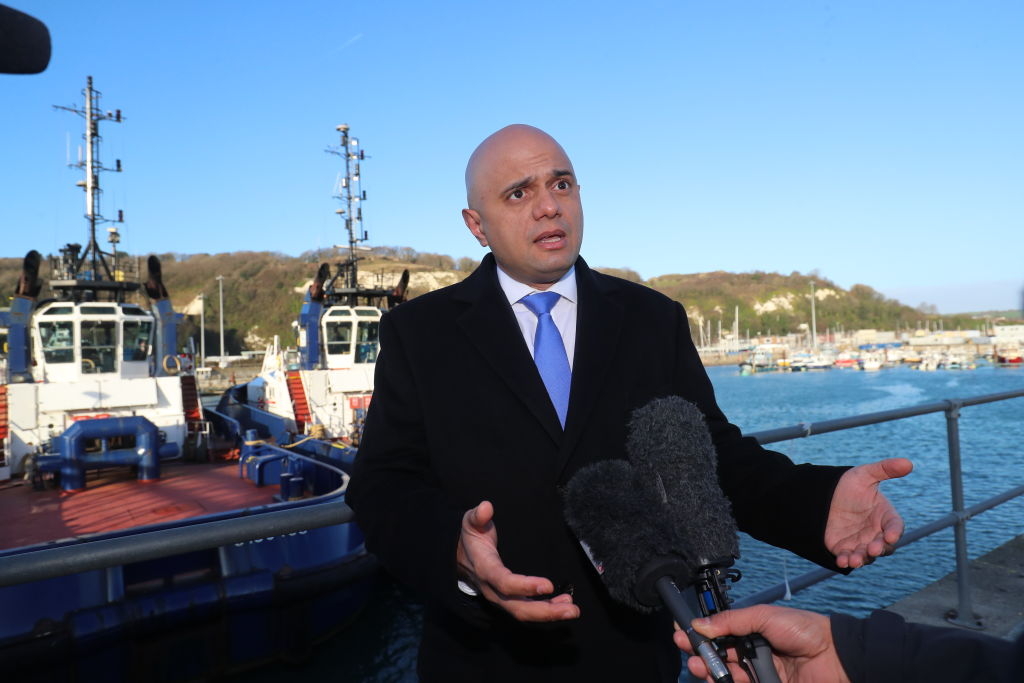
Women and girls who are coerced into marriage by their families will be allowed to give evidence in secret so they can object to their foreign spouses' visas without fear of repercussions, according to legal changes announced by UK Home Secretary Sajid Javid. Pictured: Javid addresses the media in Dover, England on January 2nd, 2019. (Photo by Gareth Fuller - WPA Pool/Getty Images)
JULY 2018
July 1. Mubarek Ali, a 35-year-old former ringleader of a Telford child sex abuse gang, was sent back to prison after breaching the terms of his parole. In 2012, Ali was sentenced to 22 years in prison for child prostitution offenses, but was automatically released in 2017 after serving only five years. Telford MP Lucy Allan said there are "many questions to be answered" about why Ali was released, and also about how the justice system treats so-called grooming cases:
"Now he is back in jail, justice demands that he must serve the remainder of his sentence in custody; anything less would show a casual disregard for the nature of his crimes and for the victims whose lives he changed forever."
by Majid Rafizadeh • January 8, 2019 at 4:00 am
Many apologists say that Islam is a religion of peace. What they do not say is that, according to Islam, "peace" is to come only after all the world has converted to Islam. Until then, all the world is divided in two: dar al-Islam ("the House of Islam"), made up those who already believe, and dar al-harb ("the House of War"), made up of those who have yet to "believe". If one is to follow the conclusions of doctrines based on jihad and sharia, after all the disbelievers believe, then there will be peace.
What is odd, is that even after countless attacks in Europe just since 2001, when we have all seen and felt this House of War on our flesh, no one ever mentions its existence. How come we never hear more about this House of War?
What we are seeing, but may not wish to see, is -- as Erdogan pointed out -- mainstream Islam.
My message to apologists for Islamism is simple: Those who are whitewashing the purveyors of radical violence and extremism -- by changing the subject or accusing others, often unjustly, of racism, discrimination, oppression, or "Islamophobia" -- are contributing to their empowerment.
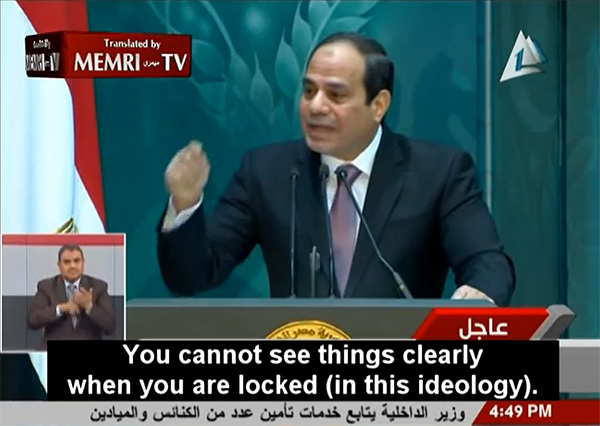
Egyptian President Abdel Fattah el-Sisi delivers a historic speech to top Islamic scholars and clergy at Al-Azhar University in Cairo, December 28, 2014. (Image source: MEMRI)
As someone who grew up in fundamentalist Muslim countries, the continuing spread in the West of apologists for sharia law is, to say the least, intriguing. It is, of course, good-hearted to wish people from other cultures to feel welcome. Many of these apologists, however, have no first-hand experience of how it feels actually to live in that part of the world or to be a victim of day-by-day radical Islam. What is painful is that although many of these apologists have never lived under Islamist rules, they often act as if they had.
First, as Turkish President Recep Tayyip Erdogan correctly said, "There is no moderate Islam; Islam is Islam."
Islam, however, can be interpreted. Even Erdogan has said -- although it is not clear what he meant by it -- that, "Islam must be updated."
Egyptian President Abdel Fattah el-Sisi, also expressed similar views:
by Khaled Abu Toameh • January 7, 2019 at 5:00 am
The biggest losers from this internal bloodletting are the Palestinians living under these leaders in the Palestinian Authority (PA) and Hamas-ruled Gaza.
The dispute between Hamas and Fatah is not over who will bring democracy and a better economy to the Palestinians. They are not fighting over who will improve the living conditions of the Palestinians in the West Bank and Gaza Strip by building new schools and hospitals. They are not fighting over who will introduce major reforms to the Palestinian government and end financial and administrative corruption. They are not fighting over the need for freedom of expression and a free media.
Mahmoud Abbas, the Hamas leaders correctly argue, is not a rightful or legitimate president. If Abbas were to sign a deal with Israel, people could come along later and say that he lacked the legal authority to do so; they would be right.
In order for any peace process to move forward, the Palestinians first need to stop attacking each other. Then, they need to come up with new leaders who actually give a damn about their people.
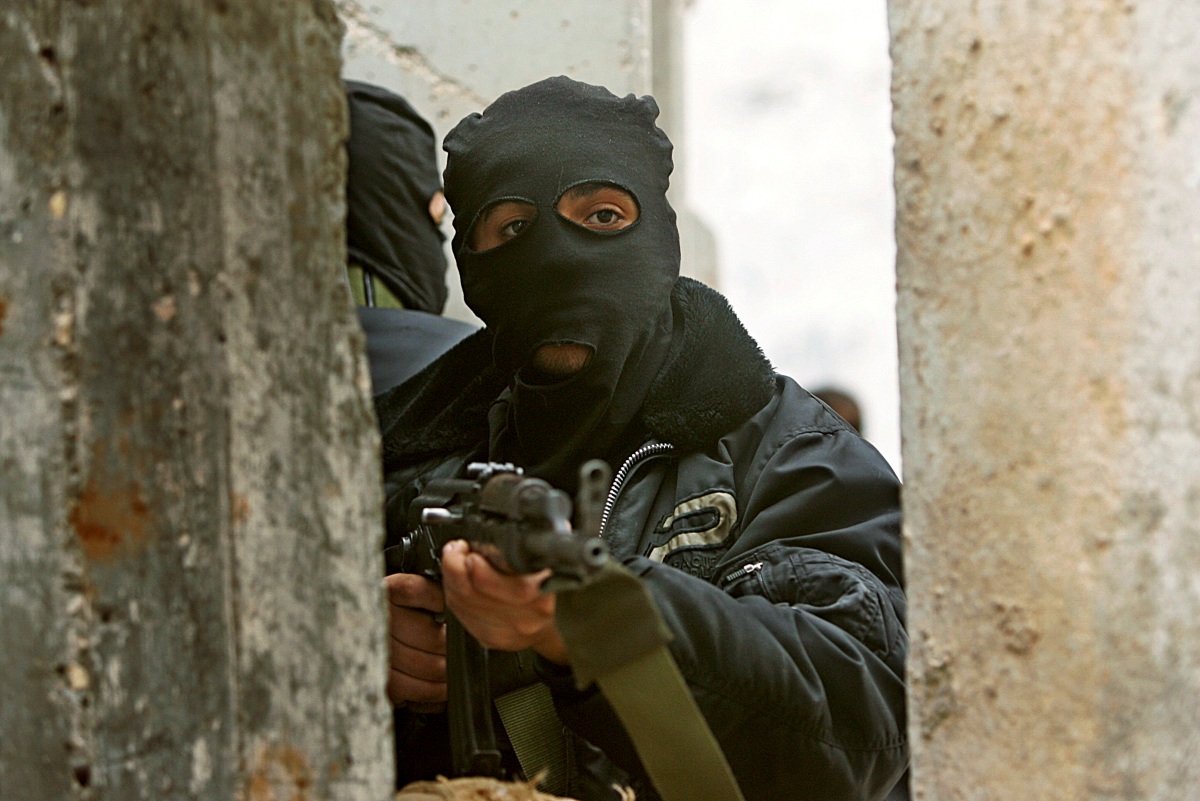
Palestinian Authority President Mahmoud Abbas and his senior aides and advisers have yet to overcome the deep humiliation they suffered in 2007 when Hamas militiamen overthrew their regime in the Gaza Strip and killed several PA and Fatah men. Pictured: Fatah gunmen guard the home of a senior Fatah official in the Gaza Strip on January 30, 2007, during the violent Hamas takeover of the Gaza Strip. (Photo by Abid Katib/Getty Images)
The Palestinians' major ruling groups, Fatah and Hamas, are now saying they are done with each other: that the divorce is final.
Recent days and weeks have witnessed the two groups maligning each other beyond anything previously seen. Fatah and Hamas have reached a new level of mutual loathing. At times, it even seems as if Fatah and Hamas hate each other more than they hate Israel.
Many in the West say they would like to see Israel and the Palestinians return to the negotiating table. They want Israelis and Palestinians to resume the so-called peace process. They are hoping that Israel and the Palestinians will manage to reach a historic agreement that would end the Israeli-Arab conflict and bring real peace to the Middle East.
by Malcolm Lowe • January 7, 2019 at 4:00 am
Irish PM Varadkar has made an Irish joke out of Ireland by his own opposition to changing the "backstop." To claim that an easily removable obstacle that will gravely harm Ireland provides essential protection to Ireland may not be the funniest joke in Irish history, but it is a good candidate for becoming the most expensive one.
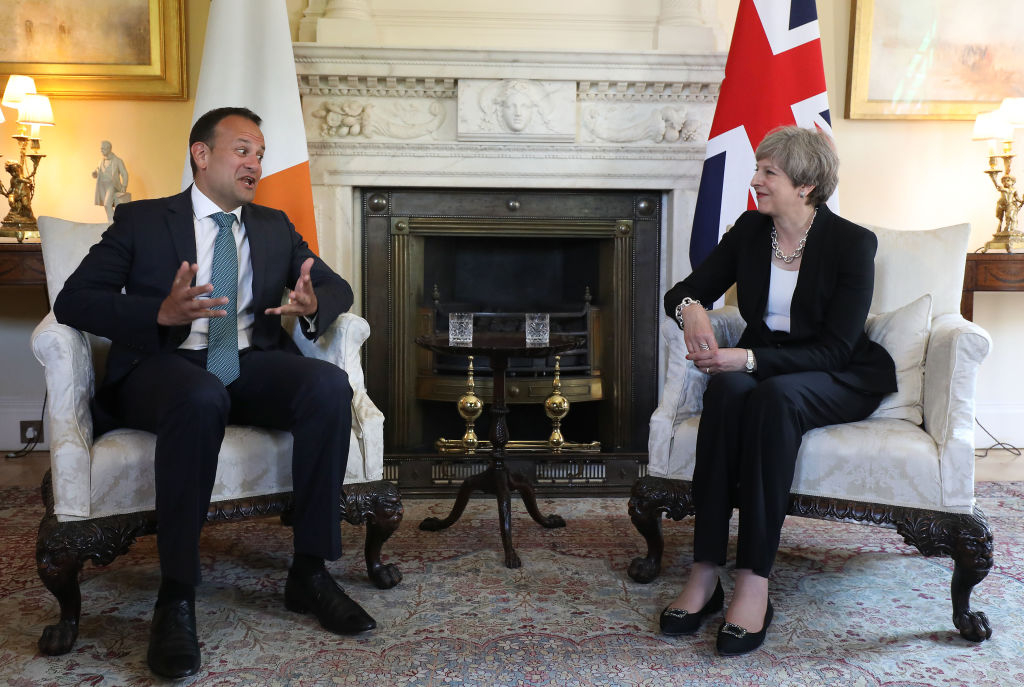
Given the harm that Ireland is about to suffer from the EU's insistence on the Brexit "backstop," one would imagine that Irish PM Leo Varadkar's would be the first friendly ear that UK PM Theresa May would find among European leaders. Instead, he has vetoed any reformulation of the "backstop," insisting that "the deal could not be unpicked." Pictured: May hosts Varadkar in London on June 19, 2017. (Photo by Philip Toscano - WPA Pool/Getty Images)
As the resumption of the Brexit debate looms in the House of Commons, it is reported that the European Commission is haughtily retaining its refusal to consider any revision to the Withdrawal Agreement (WA); this attitude is also backed by the numerous leaders of European Union countries whom UK PM Theresa May has contacted. Those leaders assume that, like most of them themselves, the UK will eventually grovel before the Commission and accept its dictate.
The European leaders are too young, perhaps, to remember that most of their countries would have become German dominions and satellites if the UK had not refused to grovel to Hitler in July 1940 after the Fall of France, fighting on alone in Europe and North Africa. As Germany discovered later that its misjudgment of the UK would end with the devastation of Germany, today the UK is preparing resolutely for a no-deal Brexit that will cost it dearly, but the EU more dearly.
by Guy Millière • January 6, 2019 at 6:00 am
French officials evidently understand that the terrorists are engaged in a long war and that it will be difficult to stop them; so they seem to have given in. These officials are no doubt aware that young French Muslims are being radicalized in increasing numbers. The response, however, has been to strengthen Muslim institutions in France.
At the time President Macron was speaking, one of his emissaries was in Morocco to sign the UN Global Compact for Safe, Orderly and Regular Migration, which defines immigration as "beneficial" for the host countries. Under it, signatory states pledge to "strengthen migrant-inclusive service delivery systems."
A group of retired generals published an open letter, saying that signing the Global Compact was a further step towards "the abandonment of national sovereignty" and noted that "80% of the French population think that immigration must be halted or regulated drastically".
The author Éric Zemmour described the "yellow vests" revolt as the result of the "despair of people who feel humiliated, forgotten, dispossessed of their own country by the decisions of a contemptuous caste".
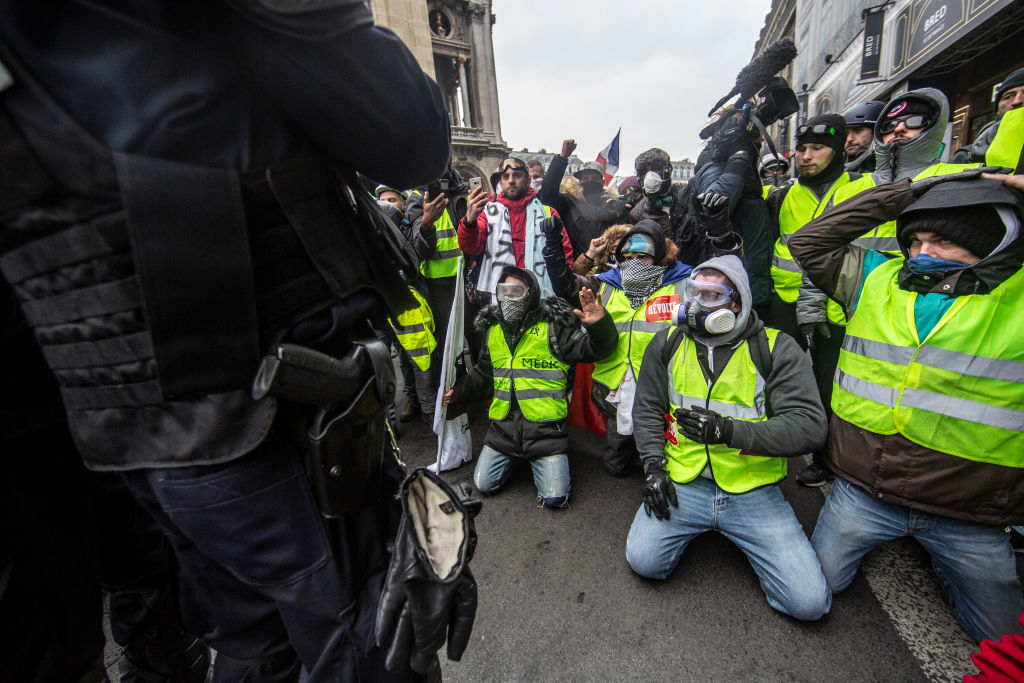
French President Emmanuel Macron seems to hope that weariness will lead the "yellow vests" protestors to give up, but there seems no sign of it yet. On the contrary, the "yellow vests" seem dedicated to bringing him down. Pictured: "Yellow vests" protesters on December 15, 2018 in Paris, France. (Photo by Veronique de Viguerie/Getty Images)
Strasbourg, France. Christmas market. December 11th, 8pm. A man shouting, "Allahu Akbar" ("Allah is the greatest") shoots at passersby, then wounds several with a knife. He murders three people on the spot and wounds a dozen others, some severely. Two will later die of their wounds. The murderer escapes. Two days later, the police shoot him dead.
He was known to the police. When members of the General Directorate of Internal Security and some gendarmes came to his home a few hours earlier, he had escaped. Although they knew he was an armed and dangerous Islamist ready to act, and that Christmas markets had been, and could be, likely targets, no surveillance was in place.
by Amir Taheri • January 6, 2019 at 4:00 am
The Khomeinist revolution in Iran has failed to "export" its model to a single country, while making Iran poorer and more vulnerable than it had been under the Shah.
The political schizophrenia gives the impression that one is dealing with two Irans: one Iran as a state and another as a revolution. The good news is that, perhaps out of necessity, a new political culture is taking shape inside Iran, one that instinctively links politics to concrete issues of real life rather than abstract notions linked to revolutionary utopias.
What millions of Iranians demand is a restoration of the authority of their state which, in turn, requires, the closure of the revolutionary chapter.
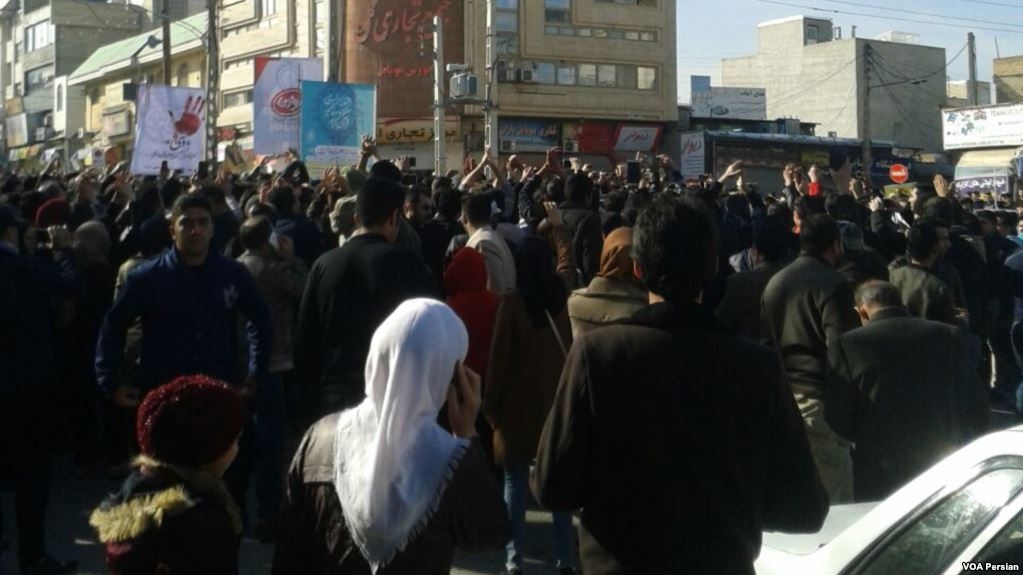
Over the past two years, Iran has witnessed more than 100 strikes by people from virtually all walks of life. It has also been shaken by two nationwide uprisings mobilizing millions of protesters. Pictured: Anti-regime protestors in Kermanshah, Iran, on December 29, 2017. (Image source: VOA News/Wikimedia Commons)
As the leadership in Tehran prepares to mark the 40th anniversary of the Khomeinist revolution, a growing number of Iranians are wondering whether the time has come for their country to close that chapter and resume its historic path as a nation-state.
The need for Iran to move beyond the Khomeinist revolution was the theme of a seminar last month at Westminster University in London where the return of Iran as a nation-state was highlighted as an urgent need for regional peace and stability.
The Khomeinist revolution in Iran has failed to "export" its model to a single country, while making Iran poorer and more vulnerable than it had been under the Shah.
|
|
|
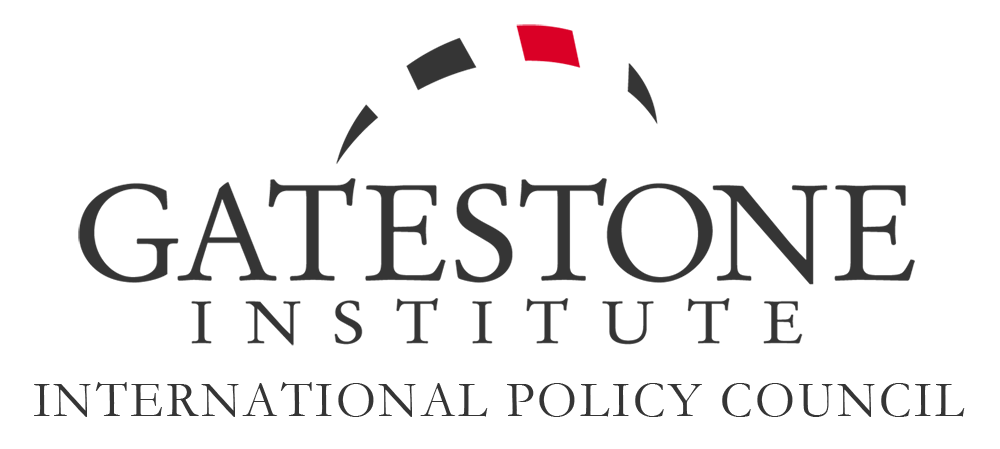






No comments:
Post a Comment